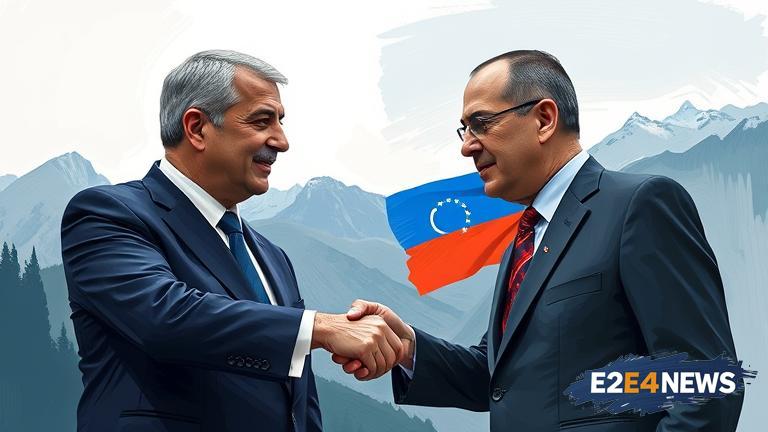In a recent interview, Gia Kuchava, a Georgian official, expressed optimism about the potential benefits of improved relations between Azerbaijan and Armenia. The two countries have been locked in a decades-long conflict over the disputed Nagorno-Karabakh region, but recent developments suggest a possible thaw in relations. Kuchava believes that Georgia stands to gain from this rapprochement, citing the country’s strategic location at the crossroads of Europe and Asia. With its unique position, Georgia could play a key role in facilitating trade and economic cooperation between Azerbaijan and Armenia. The country’s infrastructure, including its ports and transportation networks, could be used to support the exchange of goods and services between the two nations. Furthermore, Georgia’s experience in navigating complex regional politics could serve as a model for Azerbaijan and Armenia as they work to improve their relations. Kuchava also highlighted the importance of international support for the normalization process, noting that the involvement of organizations such as the European Union and the United States could help to build trust and confidence between the parties. The Georgian official emphasized that the rapprochement between Azerbaijan and Armenia is a positive development for the entire region, as it could lead to increased stability and cooperation. He also noted that Georgia is committed to supporting the peace process and is willing to share its expertise and experience with its neighbors. In addition to the potential economic benefits, Kuchava believes that improved relations between Azerbaijan and Armenia could also have a positive impact on regional security. With reduced tensions between the two countries, the risk of conflict in the region could decrease, creating a more stable environment for all countries involved. The Georgian official also emphasized the importance of people-to-people diplomacy in supporting the normalization process, noting that increased contact and cooperation between citizens of Azerbaijan and Armenia could help to build bridges and foster greater understanding. Kuchava expressed hope that the rapprochement between Azerbaijan and Armenia could serve as a model for other countries in the region, demonstrating the potential for former adversaries to put aside their differences and work towards a more peaceful and cooperative future. He also noted that Georgia is committed to playing a constructive role in regional affairs, working to promote stability, security, and cooperation throughout the Caucasus. The interview with Kuchava highlighted the complex and nuanced nature of regional politics in the Caucasus, where multiple countries and interests are at play. However, it also demonstrated the potential for cooperation and progress, even in the face of long-standing conflicts and challenges. As Azerbaijan and Armenia work to improve their relations, Georgia is well-positioned to play a supportive role, using its experience and expertise to help facilitate the normalization process. The country’s strategic location and strong international connections make it an ideal partner for both Azerbaijan and Armenia, and its commitment to regional cooperation and stability could help to create a more positive and constructive environment for all countries involved. In conclusion, the potential rapprochement between Azerbaijan and Armenia is a significant development for the region, with far-reaching implications for trade, security, and cooperation. Georgia, with its unique position and experience, is well-placed to support this process, and its officials, such as Gia Kuchava, are playing an important role in promoting regional stability and cooperation. As the situation continues to evolve, it will be important to watch for further developments and to support efforts to promote peace, stability, and cooperation throughout the Caucasus.
